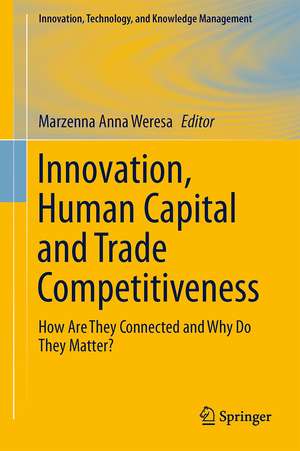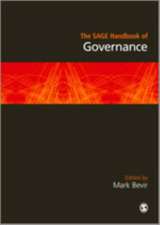Innovation, Human Capital and Trade Competitiveness: How Are They Connected and Why Do They Matter?: Innovation, Technology, and Knowledge Management
Editat de Marzenna Anna Weresaen Limba Engleză Hardback – 25 noi 2013
The book explores non-traditional drivers of competitiveness in both theory and practice. First, chapters 1 through 4 present theoretical and methodological aspects of the relationships among international trade, human capital and innovation. Here the authors address the controversy associated with the concept of competitiveness itself and its measurement, while paying special attention to the political development of comparative advantages related to international trade. The second part of the monograph, chapters 5 through 8, is of empirical nature. This section contains case studies of selected countries that represent models of various national innovation systems. Finally, the theoretical and practical aspects are integrated, allowing policymakers and financial and business leaders to consider how their decisions can influence their countries’ competitive positions through their investments in innovation and human capital.
| Toate formatele și edițiile | Preț | Express |
|---|---|---|
| Paperback (1) | 650.55 lei 6-8 săpt. | |
| Springer International Publishing – 23 aug 2016 | 650.55 lei 6-8 săpt. | |
| Hardback (1) | 656.89 lei 6-8 săpt. | |
| Springer International Publishing – 25 noi 2013 | 656.89 lei 6-8 săpt. |
Din seria Innovation, Technology, and Knowledge Management
- 15%
 Preț: 643.99 lei
Preț: 643.99 lei -
 Preț: 281.97 lei
Preț: 281.97 lei - 18%
 Preț: 954.62 lei
Preț: 954.62 lei - 15%
 Preț: 653.14 lei
Preț: 653.14 lei - 18%
 Preț: 945.62 lei
Preț: 945.62 lei - 18%
 Preț: 890.54 lei
Preț: 890.54 lei - 15%
 Preț: 640.06 lei
Preț: 640.06 lei -
 Preț: 383.93 lei
Preț: 383.93 lei - 15%
 Preț: 633.02 lei
Preț: 633.02 lei - 18%
 Preț: 1124.60 lei
Preț: 1124.60 lei - 18%
 Preț: 956.81 lei
Preț: 956.81 lei -
 Preț: 389.49 lei
Preț: 389.49 lei - 15%
 Preț: 655.13 lei
Preț: 655.13 lei - 20%
 Preț: 570.97 lei
Preț: 570.97 lei - 15%
 Preț: 642.03 lei
Preț: 642.03 lei - 18%
 Preț: 941.50 lei
Preț: 941.50 lei - 15%
 Preț: 643.00 lei
Preț: 643.00 lei - 18%
 Preț: 732.52 lei
Preț: 732.52 lei - 15%
 Preț: 637.59 lei
Preț: 637.59 lei - 18%
 Preț: 890.06 lei
Preț: 890.06 lei - 15%
 Preț: 635.47 lei
Preț: 635.47 lei - 15%
 Preț: 638.57 lei
Preț: 638.57 lei -
 Preț: 391.99 lei
Preț: 391.99 lei -
 Preț: 391.99 lei
Preț: 391.99 lei - 15%
 Preț: 632.22 lei
Preț: 632.22 lei - 20%
 Preț: 584.72 lei
Preț: 584.72 lei - 15%
 Preț: 642.18 lei
Preț: 642.18 lei - 18%
 Preț: 894.16 lei
Preț: 894.16 lei - 18%
 Preț: 943.73 lei
Preț: 943.73 lei - 15%
 Preț: 644.49 lei
Preț: 644.49 lei - 18%
 Preț: 947.85 lei
Preț: 947.85 lei - 18%
 Preț: 954.45 lei
Preț: 954.45 lei - 18%
 Preț: 1006.72 lei
Preț: 1006.72 lei - 18%
 Preț: 727.31 lei
Preț: 727.31 lei - 15%
 Preț: 642.51 lei
Preț: 642.51 lei - 18%
 Preț: 953.65 lei
Preț: 953.65 lei - 15%
 Preț: 639.59 lei
Preț: 639.59 lei - 15%
 Preț: 645.47 lei
Preț: 645.47 lei - 18%
 Preț: 952.26 lei
Preț: 952.26 lei - 15%
 Preț: 639.08 lei
Preț: 639.08 lei
Preț: 656.89 lei
Preț vechi: 772.81 lei
-15% Nou
Puncte Express: 985
Preț estimativ în valută:
125.69€ • 131.23$ • 104.03£
125.69€ • 131.23$ • 104.03£
Carte tipărită la comandă
Livrare economică 05-19 aprilie
Preluare comenzi: 021 569.72.76
Specificații
ISBN-13: 9783319020716
ISBN-10: 3319020714
Pagini: 504
Ilustrații: XVI, 486 p. 135 illus., 17 illus. in color.
Dimensiuni: 155 x 235 x 32 mm
Greutate: 0.88 kg
Ediția:2014
Editura: Springer International Publishing
Colecția Springer
Seria Innovation, Technology, and Knowledge Management
Locul publicării:Cham, Switzerland
ISBN-10: 3319020714
Pagini: 504
Ilustrații: XVI, 486 p. 135 illus., 17 illus. in color.
Dimensiuni: 155 x 235 x 32 mm
Greutate: 0.88 kg
Ediția:2014
Editura: Springer International Publishing
Colecția Springer
Seria Innovation, Technology, and Knowledge Management
Locul publicării:Cham, Switzerland
Public țintă
ResearchCuprins
Preface.- Part I Human Capital and Innovations vs. Competitive Advantages in Foreign Trade.- Chapter 1 Theoretical Grounds of the Development of Long-Term Competitive Advantages in International Trade.- Chapter 2 Human Capital and Innovation: Basic Concepts, Measures and Interdependencies.- Chapter 3 Concept of National Innovation System and International Competitiveness: Theoretical Approach.- Chapter 4 Innovations and Human Capital as Determinants of the Competitiveness of Nations in International Trade: the Model Approach.- Part II Changes in Competitive Advantages in Foreign Trade and National Innovation System Development: Comparing Countries in Europe, North America and Asia.- Chapter 5 International Competitiveness of Countries with Dynamic Innovation Systems.- Chapter 6 International Competitiveness of Countries with Performing Innovation Systems.- Chapter 7 International Competitiveness of Countries with Catching up Innovation Systems.- Chapter 8 International Competitiveness of Countries with Unbalanced Innovation Systems.- Summary and Conclusions Regarding Economic Policies Supporting Medium- and Long-Term Competitive Position of Domestic Goods on Foreign Markets.
Notă biografică
Marzenna Anna Weresa, PhD, is a professor of the World Economy Research Institute at the Warsaw School of Economics (Poland), and the Institute’s director. She holds D.Sc. in Economics (habilitation, 2003) and PhD degree in Economics (1995) from the Warsaw School of Economics in Poland. In 1999-2000 she worked as a research fellow at the University College London. She also was a Visiting Professor at the University of Leicester in the UK and at the Northeastern Illinois University in Chicago (USA). She has been working as an expert for the European Commission (projects on R&D, innovation and technological competitiveness) and conducted advisory projects for enterprises and governmental organizations. Her research focuses on innovation, technology transfer and foreign direct investment. She authored and co-authored over 80 books and scientific articles.
Textul de pe ultima copertă
This work focuses on researching and establishing the importance of human capital and innovation as determinants of competitive advantages in international trade—in the context of rapidly evolving technological advancement, globalization, and economic integration. The processes that accompany the shift from industrial economics to a knowledge-based economy are currently the object of interest of both scientists, politicians, investors and entrepreneurs. In many countries, the traditional sources of socioeconomic development, such as low labor costs, availability of inexpensive raw materials, and favorable geographic location are waning. These economies are searching for new sources of competitive advantage that will allow for maintaining growth, among other things by boosting participation in international trade.
The book explores non-traditional drivers of competitiveness in both theory and practice. First, chapters 1 through 4 present theoretical and methodological aspects of the relationships among international trade, human capital and innovation. Here the authors address the controversy associated with the concept of competitiveness itself and its measurement, while paying special attention to the political development of comparative advantages related to international trade. The second part of the monograph, chapters 5 through 8, is of empirical nature. This section contains case studies of selected countries that represent models of various national innovation systems. Finally, the theoretical and practical aspects are integrated, allowing policymakers and financial and business leaders to consider how their decisions can influence their countries’ competitive positions through their investments in innovation and human capital.
The book explores non-traditional drivers of competitiveness in both theory and practice. First, chapters 1 through 4 present theoretical and methodological aspects of the relationships among international trade, human capital and innovation. Here the authors address the controversy associated with the concept of competitiveness itself and its measurement, while paying special attention to the political development of comparative advantages related to international trade. The second part of the monograph, chapters 5 through 8, is of empirical nature. This section contains case studies of selected countries that represent models of various national innovation systems. Finally, the theoretical and practical aspects are integrated, allowing policymakers and financial and business leaders to consider how their decisions can influence their countries’ competitive positions through their investments in innovation and human capital.
Caracteristici
Explores the interface between innovation, human capital and competitive advantages in international trade Integrates theory, policy, and practice Features 12 in-depth country case studies from Europe, Asia, and the Americas ? Includes supplementary material: sn.pub/extras
















